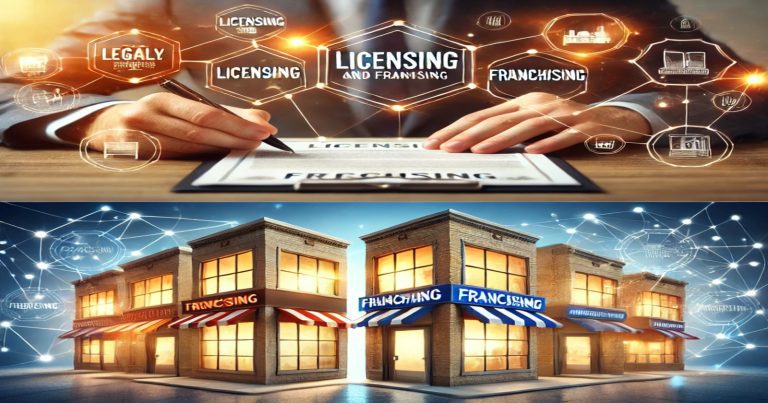Every day, companies are always finding ways to spread their businesses across different geographies and channels with minimum operational overheads. Of course, two of the best methods they hope to use are licensing and franchising. Both models allow businesses to get external partnerships to grow but work differently, with different legal agreements, control mechanisms, and financial structures.
This article will explore the key differences and similarities between licensing and franchising, the role of intellectual property, how license agreements and franchise agreements work, and essential concepts like royalty fees, territorial rights, and franchise models.
What is Licensing?
Licensing is a business agreement between the owner of intellectual property, say, a brand name, trademark, patent, or technology, and another party and permits granting rights to that party to use such property for a royalty fee. The intellectual property owner is called the licensor, and the party receiving the rights is called the licensee.
A license agreement details the conditions and terms within which the licensed person can employ the intellectual property. It will detail how it is manufactured, marketed, or even sold, its payment structure and duration, and other geographical aspects of operation.
For example, a clothing company can franchise by letting another firm manufacture and distribute its registered products. This is because the licensor benefits through the royalties in production and distribution while, at the same time, having nothing to do with the matter, and for the licensee, a famous brand will be acquired so that their sales will be maximised.
What is Franchising?
Franchising is a business model wherein a company (the franchisor) grants the right to operate a business under its brand name and establish a business system for another party, the franchisee. This right includes specific guidelines about business operations, marketing, customer service, and even product offerings.
The franchise agreement defines the legal framework of franchising. It details the roles and responsibilities the franchisor and the franchisee should assume. This is where franchising differs from licensing because franchising provides the franchisor with greater operational control to ensure that the brand has consistency at all locations maintained by the franchisee.
For example, a McDonald’s company is owned by a franchisee that runs other stores but is strictly held within the parent corporate firm’s guidelines. It would not be full payment for opening a McDonald’s restaurant or even a payment called initiation. Instead, it is the same royalty the franchisor can earn and, in most cases, one payment in exchange for acquiring the franchise fee.
Difference Between Licensing and Franchising
Licensing and franchising both allow a business to use another party’s brand or intellectual property, but they differ along several dimensions:
| Dimension | Licensing | Franchising |
| Legal Agreement | License Agreement | Franchise Agreement |
| Control | Limited control over the licensee’s operations | High operational control over the franchisee |
| Intellectual Property | Focuses on IP rights (trademarks, patents, etc.) | Includes IP plus business model and processes |
| Royalty Fees | Based on sales, production, or fixed fees | Includes royalty fees plus initial franchise fees |
| Business Model | Does not follow a specific business format | Follows a standardised franchise model |
| Support Provided | Minimal support from the licensor | Extensive support, training, and guidance provided |
| Territorial Rights | Often flexible or non-exclusive | Often includes exclusive territorial rights |
Key Components of Licensing
A license agreement details the conditions and terms within which the licensed person can employ the intellectual property. It will detail how it is manufactured, marketed, or even sold, its payment structure and duration, and other geographical aspects of operation.
The components of licensing are discussed below:-
Intellectual Property
Licensing is the heart of intellectual property, which can be a trademark, copyright, patent, software, or trade secret. Licensing allows the owner of the IP to generate income from his inventions without having to manufacture or sell the products themselves.
License Agreement
This is the actual legal contract binding the licensor and licensee into an agreement. The details discussed include the extent of the licensing, the category of IP in question, time, payment term, and further information on terms for renewal and/or termination.
Royalty Fees
Most license agreements pay the license fee through royalties from the licensee to the licensor. Therefore, fixed-scale payments, percentages based on sales, or percentages based on production volumes may exist. This is paying out a steady income for the licensor.
Rights and Restrictions on Licensing
This will contain information on the licensing rights to be granted to the licensee with the agreed terms. Such details include no right to modify the IP, geographical or physical bounds, and laws that rule how the IP is used in the marketing and products.
Product Licensing and Brand Licensing
There are two types of licensing: product licensing, in which the IP of the licensor is used to manufacture some products, and brand licensing, where the licensee uses the licensor’s brand for marketing purposes without manufacturing some products.
Elements of Franchise
Franchising is a business model wherein a company (the franchisor) grants the right to operate a business under its brand name and establish a business system for another party, the franchisee. The elements of franchising are as follows:-
Relationship Between Franchisee and Franchisor
The franchisor gives the franchisee the license to operate under the brand name and business model in franchising. The franchisor provides support, training, and a proven business system; the franchisee runs the daily operations.
Franchise Agreement
A franchise agreement is a comprehensive legal document detailing the obligations of both parties. The details include fees, operational guidelines, marketing strategies, and rules on using the franchisor’s trademarks and branding.
Royalty Fees and Initial Franchise Fees
Franchisees generally pay royalties, which are ongoing payments based on a percentage of the revenue. They also pay an initial franchise fee, which covers the cost of training, setup, and access to the brand.
Operational Control
Unlike licensing, franchising has stringent operational control by the franchisor. This will ensure that each franchise franchisee has the same quality, customer experience, and brand identity across locations.
Master Franchise and Territorial Rights
Some franchisors issue master franchise rights where the franchisee can own multiple units in a particular area. Territorial rights are also given as one has authoritative control in a specific area without head-on competition by other franchisees.
Advantages and Disadvantages of Licensing and Franchising
Licensing and Franchising both have advantages and disadvantages that add to the company’s growth and hinder it. The deatled advantages and disadvantages of licensing and franchising are as follows:-
Advantages of Licensing
- Passive Income Generation: passive income is generated through royalty fees without running daily operations.
- Global Reach: It can venture into new markets with relatively less capital.
- Flexibility: It does not interfere much with the licensee’s business.
Disadvantages of Licensing:
- Lack of Control: The licensor has no control over the usage of the IP by the licensee.
- Risk to Brand Reputation: Poor quality or misuse of IP by the licensee can harm the brand.
- Dependence on Licensee: The income of the licensor is solely dependent on the licensee.
Advantages of Franchising
- Rapid Business Growth: Expands the brand rapidly with nominal capital input.
- Control Over Operations: It enforces brand uniformity through rigorous operating practices.
- Permanent Income: The royalty and franchise fees constitute steady income.
Limitations of Franchising
- Legal Complexity: Legal documentation, which includes the franchise agreement, is required.
- Heavy Support Costs: The franchisor has to incur costs for continuous training, support, and marketing support.
- Competing Interests: The interests of the franchisor and franchisee may compete, particularly regarding who is in charge and how someone will come to be in control.
Licensing vs. Franchising: Which is the Right Business?
That depends upon the business model you envision for yourself, what assets you have on hand, and how much management control you seek.
Licensing suits companies with intellectual property they may want to generate income from but do not necessarily participate in the day-to-day activities of the licensee. Most companies use this in technology, fashion, entertainment, and pharmaceuticals.
Franchising best suits companies with a proven business model that can be replicated in several locations. The type of business model is found in the food and beverage, retail, hospitality, and fitness industries.
If you wish to grow quickly but maintain brand integrity, franchising may be the answer. Licensing may be the better choice if you are more comfortable with a more relaxed, less demanding method of building your brand.
Licensing And Franchising FAQs
1. What is the difference between licensing and franchising?
Licensing is the right to use someone’s intellectual property. Franchising, conversely, is the transfer of an entire business model with operating controls.
2. What are royalty fees in licensing and franchising?
Royalties are percentage payments on sales or revenue that the licensee or franchisee makes to the licensor or franchisor.
3. Can one company be a franchisor as well as a licensor?
Yes, a company can both license and franchise. For instance, it might license its brand for merchandise but continue to run a franchise model for its core business.
4. What is a master franchise?
A master franchise is an arrangement by which a franchisee can open several units in a particular geography and can even sub-franchise third operators.
5. What are territorial rights in franchising?
The franchisee is given territorial rights that ensure exclusive control over a specific geographical area. No other franchisee can operate in the exact location.


